中国文化概论英文版Unit8答案资料
- 格式:doc
- 大小:1.57 MB
- 文档页数:11
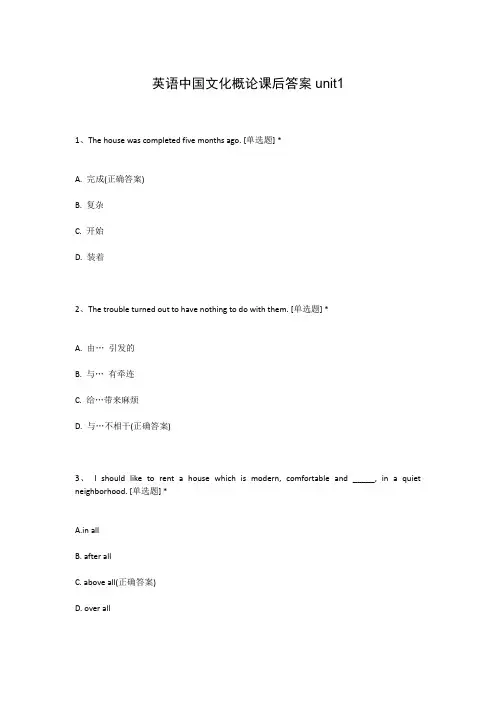
英语中国文化概论课后答案unit11、The house was completed five months ago. [单选题] *A. 完成(正确答案)B. 复杂C. 开始D. 装着2、The trouble turned out to have nothing to do with them. [单选题] *A. 由…引发的B. 与…有牵连C. 给…带来麻烦D. 与…不相干(正确答案)3、I should like to rent a house which is modern, comfortable and _____, in a quiet neighborhood. [单选题] *A.in allB. after allC. above all(正确答案)D. over all4、It was _____ that the policy of reform and opening up came into being in China. [单选题] *A. in the 1970s(正确答案)B. in 1970sC. in the 1970s'D. in 1970's5、I_____you that I had made the right decision. [单选题] *A.ensuredB.insuredC.assured(正确答案)D.for sure6、Some people were born with a good sense of direction. [单选题] *A. 听觉B. 方向感(正确答案)C. 辨别力D. 抽象思维7、—What were you doing when the rainstorm came?—I ______ in the library with Jane. ()[单选题] *A. readB. am readingC. will readD. was reading(正确答案)8、Mr. White likes to live in a _______ place. [单选题] *A. quiteB. quiet(正确答案)C. quickD. quietly9、37.—What will you be ___________?—I'm not sure. Maybe I'll be a doctor like my father. [单选题] *A.right nowB.in the future(正确答案)C.at onceD.at the moment10、During the Spring Festival, people in Northern China usually eat _______ as a traditional Chinese food. [单选题] *A. pizzaB. dumplings(正确答案)C. hamburgersD. noodles11、You could hardly imagine _______ amazing the Great Wall was. [单选题] *A. how(正确答案)B. whatC. whyD. where12、Mary _______ Math. [单选题] *A. is good at(正确答案)B. do well inC. is good forD. is good with13、The language school started a new()to help young learners with reading and writing. [单选题] *A. course(正确答案)B. designC. eventD. progress14、It’s raining heavily outside. Don’t leave _______ it stops. [单选题] *A. whileB. sinceC. until(正确答案)D. when15、Mom is making dinner. It _______ so nice! [单选题] *A. smells(正确答案)B. tastesC. feelsD. sounds16、Julia’s on holiday in Shanghai _______. [单选题] *A. in a momentB. after a momentC. at the moment(正确答案)D. at any moment17、_______ after dinner is good for our health. [单选题] *A. WalksB. Walking(正确答案)C. WalkedD. Walk18、Alice hopes to _______ more friends at her new school. [单选题] *A. visitB. make(正确答案)C. missD. take19、My father and I often go ______ on weekends so I can ______ very well. ()[单选题] *A. swim; swimmingB. swims; swimC. swimming; swimmingD. swimming; swim(正确答案)20、You should _______ fighting with your parents although you may have different ideas from time to time. [单选题] *A. suggestB. enjoyC. avoid(正确答案)D. practice21、You can't see many _____ in a hospital. [单选题] *A. man nurseB. men nurses(正确答案)C. men nurseD. man nurses22、You can distinguish the twins very easily, _____Tom is quite while Jack is active. [单选题] *A. soB. butC. for(正确答案)D. and23、?I am good at schoolwork. I often help my classmates _______ English. [单选题] *A. atB. toC. inD. with(正确答案)24、The blue shirt looks _______ better on you than the red one. [单选题] *A. quiteB. moreC. much(正确答案)D. most25、I used to take ____ long way to take the bus that went by ____ tunnel under the water. [单选题] *A. a, aB. a. theC. a, /(正确答案)D. the, a26、He _______ walks to school, because he lives near school. [单选题] *A. sometimes(正确答案)B. neverC. doesn’tD. don’t27、40.—________ apples do we need to make fruit salad?—Let me think…We need three apples. [单选题] *A.How longB.How oftenC.How muchD.How many(正确答案)28、There is _______ meat in the fridge.Lets go and buy some. [单选题] *A. little(正确答案)B. a littleC. fewD. a few29、I will _______ from Hunan University next year. [单选题] *A. learnB. studyC. graduate(正确答案)D. come30、13.—Will you come to my party?—I am not ________ . [单选题] * A.mindB.sure(正确答案)C.happy D.Sorry。
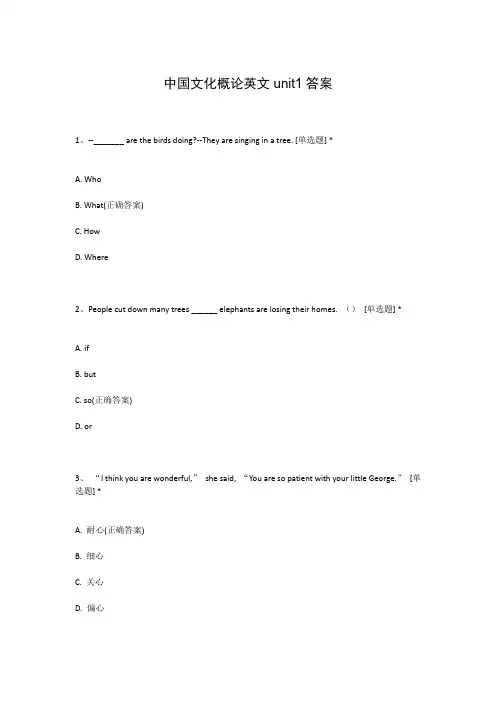
中国文化概论英文unit1答案1、--_______ are the birds doing?--They are singing in a tree. [单选题] *A. WhoB. What(正确答案)C. HowD. Where2、People cut down many trees ______ elephants are losing their homes. ()[单选题] *A. ifB. butC. so(正确答案)D. or3、“I think you are wonderful,”she said, “You are so patient with your little George.”[单选题] *A. 耐心(正确答案)B. 细心C. 关心D. 偏心4、Mum, this T-shirt is much too small for me. Would you buy me a _______ one? [单选题] *A. niceB. largeC. nicerD. larger(正确答案)5、July hardly joins in any class activities,_____? [单选题] *A. does she(正确答案)B. doesn't sheC. didn't sheD. is she6、I used to take ____ long way to take the bus that went by ____ tunnel under the water. [单选题] *A. a, aB. a. theC. a, /(正确答案)D. the, a7、Her ideas sound right, but _____ I'm not completely sure. [单选题] *A. somehow(正确答案)B. somewhatC. somewhereD. sometime8、This kind of work _______ skills and speed. [单选题] *A. looks forB. waits forC. calls for(正确答案)D. cares for9、46.The pants look cool.You can ________. [单选题] *A.try it onB.try on itC.try them on(正确答案)D.try on them10、76.AC Milan has confirmed that the England star David Beckham ()the team soon. [单选题] *A. has rejoinedB. was going to rejoinC. rejoinedD. is to rejoin(正确答案)11、6.—How can we get to the school?—________ bus. [单选题] *A.ToB.OnC.By(正确答案)D.At12、If by any chance someone comes to see me, ask him to leave a _____. [单选题] *A. message(正确答案)B. letterC. sentenceD. notice13、Ships can carry more goods than _____ means of transport. [单选题] *A. the otherB. anotherC. any other(正确答案)D. any14、Mary, together with her children ,_____ some video show when I went into the sitting room. [单选题] *A. were watchingB. was watching(正确答案)C. is watchingD. are watching15、My brother usually _______ his room after school. But now he _______ soccer. [单选题] *A. cleans; playsB. cleaning; playingC. cleans; is playing(正确答案)D. cleans; is playing the16、We need two ______ and two bags of ______ for the banana milk shake.()[单选题]*A. banana; yogurtB. banana; yogurtsC. bananas; yogurt(正确答案)D. bananas; yogurts17、You wouldn't have seen her if it _____ not been for him . [单选题] *A. hasB. had(正确答案)C. haveD.is having18、How lovely a day,()? [单选题] *A. doesn't itB. isn't it(正确答案)C.shouldn't itD.hasn't it19、( )He gave us____ on how to keep fit. [单选题] *A. some advicesB. some advice(正确答案)C. an adviceD. a advice20、Mr. Wang is coming to our school. I can’t wait to see _______. [单选题] *A. herB. him(正确答案)C. itD. them21、53.On your way home, you can buy some fruit, meat, vegetables and ________. [单选题] *A.something else(正确答案)B.else somethingC.everything elseD.else everything22、--Mom, I will not eat fast food this year. Believe me.--If you make a _______, you must keep it. [单选题] *A. jokeB. noiseC. mistakeD. promise(正确答案)23、52.I'm happy to ________ a birthday card from an old friend. [单选题] *A.buyB.makeC.loseD.receive(正确答案)24、24.I often ask my English teacher some questions ________ e-mail. [单选题] * A.by(正确答案)B.inC.forD.with25、—Can you play tennis? —______, but I’m good at football.()[单选题] *A. Yes, I can(正确答案)B. Yes, I doC. No, I can’tD. No, I don’t26、He was proud of what he had done. [单选题] *A. 对…感到自豪(正确答案)B. 对…感到满足C. 对…表示不满D. 对…表示后悔27、There are many beautiful _______ in the wardrobe. [单选题] *A. bookB. dresses(正确答案)C. cell phoneD. grocery28、What he said sounds _______. [单选题] *A. pleasantlyB. nicelyC. friendly(正确答案)D. wonderfully29、The rain is very heavy _______ we have to stay at home. [单选题] *A. butB. becauseC. so(正确答案)D. and30、( ) --------Please take my seat here.-------- __________________________. [单选题]*A. That is nice of you(正确答案)B. I think it is my seatC. No, you sit hereD. I don’t think it’s a good seat.。
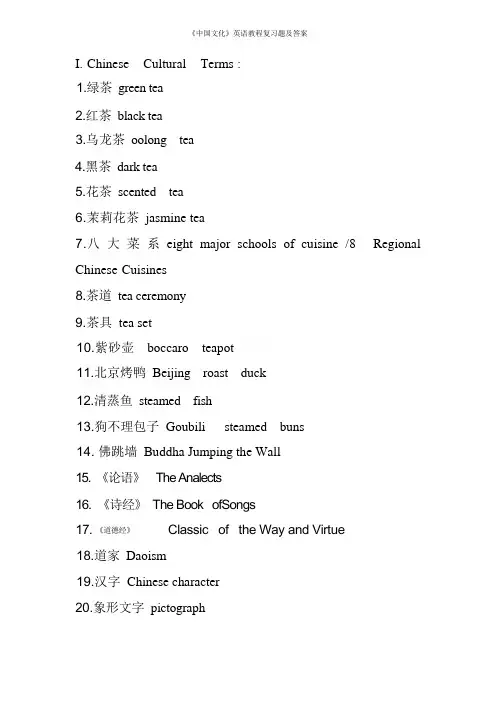
I. Chinese Cultural Terms :1.绿茶green tea2.红茶black tea3.乌龙茶oolong tea4.黑茶dark tea5.花茶scented tea6.茉莉花茶jasmine tea7.八大菜系eight major schools of cuisine /8 Regional Chinese Cuisines8.茶道tea ceremony9.茶具tea set10.紫砂壶boccaro teapot11.北京烤鸭Beijing roast duck12.清蒸鱼steamed fish13.狗不理包子Goubili steamed buns14. 佛跳墙Buddha Jumping the Wall15. 《论语》The Analects16. 《诗经》The Book ofSongs17. 《道德经》Classic of the Way and Virtue18.道家Daoism19.汉字Chinese character20.象形文字pictograph21.甲骨文oracle-bone inscription/ oracle-bone script22.篆文seal character/ seal script23.文房四宝four treasures of study24.丝绸之路the Silk Road25. 海上丝绸之路the Maritime silk road26.一带一路倡议The Belt and Road Initiative27.西域the Western regions28.敦煌石窟the Dunhuang Grottoes29.春秋时期the Spring and Autumn Period30. 方块象形文字the square-shaped pictographic character31. 颜(真卿)体the Yan style32. 民间艺术folk arts33.年画New Year pictures34.剪纸paper cutting /papercuts35.皮影戏shadow play36.苏绣Suhou Embroidery37.造纸术paper making38.印刷术printing39.佛经Buddhist scripture40.行书running script /semi-cursive script41.草书cursive script42.楷书regular script/standard script43.隶书official script/ clerical script44.砚the ink slab/ the ink stone; 墨ink stick45.六艺:礼乐射御书数“six arts” : ritual,music,archery, carriage driving , calligraphy , and mathematics46.毛笔the writing brush47.宣纸xuan paper/ rice paper48.中国书法Chinese calligraphy49.简体字:simplified characters50. 繁体字complex characters/ traditional characters51.中国结Chinese knots52.佛教Buddhism53.国徽national emblem54. 国旗national flag55. 国歌national anthemII. Multiple choices (每题三个选项中选一个最佳答案)1)Which of the following is irrelevant to the pictographic symbols of Chinese characters? (下列哪项与汉字的象形符号无关?)Aspiration. 吸Imagination.想象Creativity.创造力Allusion.典故2) Which of the following statements is true of the name of Fudan Universit(y关于复旦大学的名称,下列哪个陈述是正确的?)The characters both stand for "the sun rising on the horizon"这.些字符都代表着“太阳在地平线上升起”The name is taken from a Chinese classical poem.这个名字取自中国古典诗歌The name encourages the students to get up early in the morning.这个名字鼓励学生早上早起The characters are intended to tell the students to make progress day by day.这些字旨在让学生们一天天地进步3) Which of the following languages mostly consists of language pictures(下列语言中哪一种主要由语言图片组成?) ? B___Mandarin Chinese. 普通话Hieroglyphs of ancient Egypt.古埃及的象形文字Oracle-bone inscription. 甲骨文Seal characters.篆书4) The symbol for “swimming” is closest to (“游泳”的符号最接近的是)oracle-bone inscription 甲骨文Mandarin Chinese 普通话seal characters 篆书none of the above 没有选项5)The symbol for “athletics” contains the ingredients of (“运动”的符号包含了)dancing and running 跳舞、跑步running and swinging 跑步和摆动dancing and swinging 跳舞和摆动triathlon and football 铁人三项和足球6)All the following are the titles of Confucius excep(t以下孔子的头衔除了) ___.Ban educator 一个教育家A biologist 一个生物学家A scholar 有识之士A philosopher 一个哲学家7)The expression “filial piety” most probably means being (“孝”的意思很可能是指) ___.DLoyal to the state 忠于国家Obedient to sister(s) 听姐姐的话Responsible for the family 对家庭负责Dutiful to parents 孝顺父母8)Which of following can best describe Confucius’ view on the relationship between man and nature (下面哪一个最能说明孔子对人与自然关系的看法?) ___.D Brothers 兄弟Husband and wife 夫妇Doctor and patient 医生和病人Mother and son 母子9)Through burial and ancestral worship rituals,people can learn that (通过丧葬和祭祖仪式,人们可以了解到。
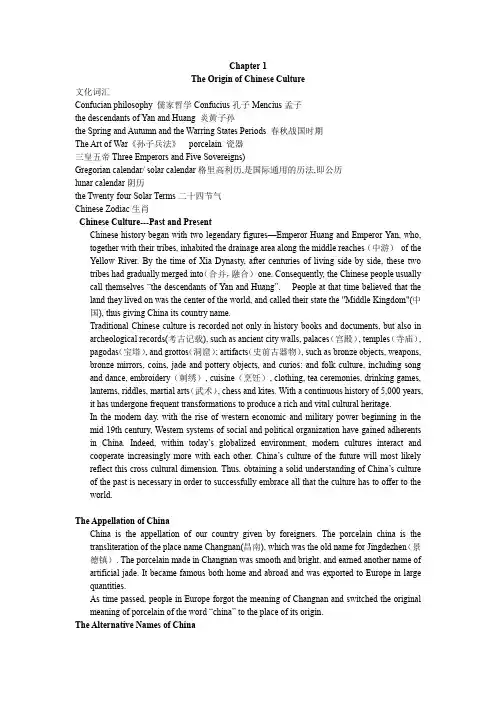
Chapter 1The Origin of Chinese Culture文化词汇Confucian philosophy 儒家哲学Confucius孔子Mencius孟子the descendants of Yan and Huang 炎黄子孙the Spring and Autumn and the Warring States Periods 春秋战国时期The Art of War《孙子兵法》porcelain 瓷器三皇五帝Three Emperors and Five Sovereigns)Gregorian calendar/ solar calendar格里高利历,是国际通用的历法,即公历lunar calendar阴历the Twenty-four Solar Terms二十四节气Chinese Zodiac生肖Chinese Culture---Past and PresentChinese history began with two legendary figures—Emperor Huang and Emperor Yan, who, together with their tribes, inhabited the drainage area along the middle reaches(中游)of the Yellow River. By the time of Xia Dynasty, after centuries of living side by side, these two tribes had gradually merged into(合并,融合)one. Consequently, the Chinese people usually call themselves “the descendants of Yan and Huang”.People at that time believed that the land they lived on was the center of the world, and called their state the "Middle Kingdom"(中国), thus giving China its country name.Traditional Chinese culture is recorded not only in history books and documents, but also in archeological records(考古记载), such as ancient city walls, palaces(宫殿), temples(寺庙), pagodas(宝塔), and grottos(洞窟); artifacts(史前古器物), such as bronze objects, weapons, bronze mirrors, coins, jade and pottery objects, and curios; and folk culture, including song and dance, embroidery(刺绣), cuisine(烹饪), clothing, tea ceremonies, drinking games, lanterns, riddles, martial arts(武术), chess and kites. With a continuous history of 5,000 years, it has undergone frequent transformations to produce a rich and vital cultural heritage.In the modern day, with the rise of western economic and military power beginning in the mid-19th century, Western systems of social and political organization have gained adherents in China. Indeed, within today’s globalized environment, modern cultures interact and cooperate increasingly more with each other. China’s culture of the future will most likely reflect this cross-cultural dimension. Thus, obtaining a solid understanding of China’s culture of the past is necessary in order to successfully embrace all that the culture has to offer to the world.The Appellation of ChinaChina is the appellation of our country given by foreigners. The porcelain china is the transliteration of the place name Changnan(昌南), which was the old name for Jingdezhen(景德镇). The porcelain made in Changnan was smooth and bright, and earned another name of artificial jade. It became famous both home and abroad and was exported to Europe in large quantities.As time passed, people in Europe forgot the meaning of Changnan and switched the original meaning of porcelain of the word “china” to the place of its origin.The Alternative Names of China⏹Chixian, Shenzhou(赤县、神州)⏹Jiuzhou (九州)⏹Hua ( 华)⏹Huaxia(华夏)⏹Zhonghua(中华)⏹Hainei(海内)Chinese MythologyChinese Mythology is a collection of cultural history, folktales(民间故事), and religions that have been passed down in oral or written form. Chinese mythology is similar to modern religion in that they both believe in relationships between mankind and a higher power.Historians have conjectured(推测)that Chinese mythology began in 12th century BC (close to the time of the Trojan War 特洛伊战争). The myths and legends were passed down in oral form for over a thousand years, before being written down in early book such as Shui Jing Zhu and Shan Hai Jing.The classification of myth神话的分类Creation myth 创世神话:Nvwa Created Man(女娲造人)Hero myth 英雄神话:Houyi Shooting the Sun(后羿射日)War myth 战争神话:Yellow Emperor Tackled Human-God(黄帝擒蚩尤)Cultural MosaicHeavenly Stems and Earthly BranchesThe standard Gregorian calendar is generally referred to as the solar calendar in China. The traditional Chinese lunar calendar, also known as the Jiazi calendar, counts the years in sixty-year cycles by combining two series of numbers---the 10 Heavenly Stems and 12 Earthly Branches.The Twenty-four Solar TermsThe traditional Chinese lunar year is divided into twenty-four solar terms, according to the position of the sun on the ecliptic in relationship to the earth. The solar terms designate agricultural periods, and can predict changing seasonal conditions, temperature, and weather throughout the course of the year. They are extremely important to agricultural production.Changes in the four seasons are determined by eight solar terms:立春( the Beginning of Spring),春分( the Spring Equinox ),立夏(the Beginning of Summer ),夏至(the Summer Solstice),立秋(the Beginning of Autumn),秋分( the Autumnal Equinox),立冬( the Beginning of Winter),冬至(the Winter Solstice )Changes in temperature are indicated by five solar terms:小暑Slight Heat ,大暑Great Heat ,处暑the Limit of Heat ,小寒Slight Cold ,大寒Great ColdChanging weather conditions are indicated by seven solar terms:雨水Rain Water ,谷雨Grain Rain ,白露White Dew ,寒露Cold Dew,霜降Frost's Descent ,小雪Slight Snow ,大雪Great Snow .Recurring natural phenomena are indicated by four solar terms:惊蛰the Waking of Insects ,清明Pure Brightness ,小满Grain Full,芒种Grain in EarChinese ZodiacIn ancient times, our ancestors counted the years with 10 heavenly stems and 12 earthly branches. Although this was scientific, most people were illiterate and could not memorize or calculate easily. Thus the animals that influenced people's lives were chosen to symbolize the terrestrial branches: the rat, ox, tiger, rabbit, dragon, snake, horse, sheep, monkey , rooster, dog and pig.Chapter 2 Culinary Culture文化词汇culinary厨房的,烹饪的;烹调用的cuisine烹饪,烹调法;菜肴main food主食,主粮(staple food )Fire temperature火候food tonic 食补“Food is the first necessity of the people”(“民以食为天。
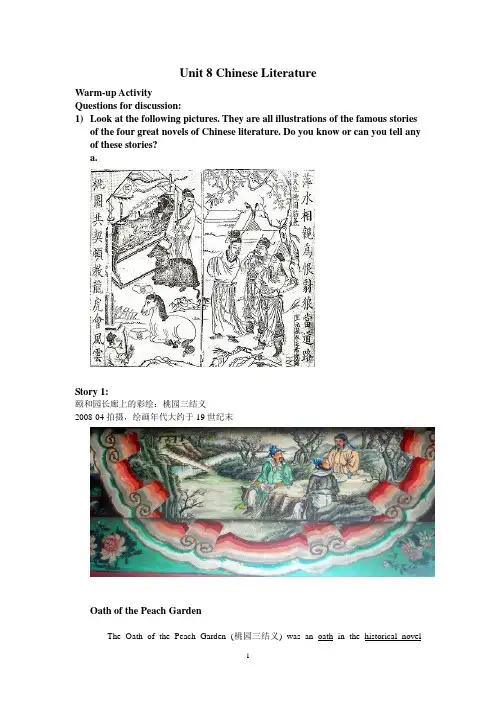
Unit 8 Chinese LiteratureWarm-up ActivityQuestions for discussion:1)Look at the following pictures. They are all illustrations of the famous storiesof the four great novels of Chinese literature. Do you know or can you tell any of these stories?a.Story 1:颐和园长廊上的彩绘:桃园三结义2008-04拍摄,绘画年代大约于19世纪末Oath of the Peach GardenThe Oath of the Peach Garden (桃园三结义) was an oath in the historical novelRomance of the Three Kingdoms, by which the three warriors Liu Bei, Guan Y u, and Zhang Fei became sworn brothers in a ceremony amid peach blossom trees. The original goal of the Peach Garden Oath was to protect the Han Dynasty from the Yellow Turbans. This act bound the three key men of the future Shu-Han Kingdom of China and is often alluded to as a symbol of fraternal loyalty. Nothing in historical records suggest such an event happened, though the three were noted to be close, to the point of sharing the same bed.The oath, as it appears in the Wikisource translation of Romance of the Three Kingdoms/Chapter 1, was this:When saying the names Liu Bei, Guan Yu and Zhang Fei, although the surnames are different, yet we have come together as brothers. From this day forward, we shall join forces for a common purpose, and come to each other's aid in times of crisis. We shall avenge the nation from above, and pacify the citizenry from below. We seek not to be born on the same day, in the same month and in the same year. We merely hope to die on the same day, in the same month and in the same year. May the gods of heaven and earth attest to what is in our hearts. If we should ever do anything to betray our friendship, may the gods in heaven strike us dead.In many other translations, only the section dealing with "dying on the selfsame day" is present. However, the three brothers do not die on the same day: Guan Yu is executed by Sun Quan, Zhang Fei is assassinated by his own men whom he treated with cruelty, and Liu Bei dies of illness after the disastrous attempts to avenge Guan Yu and reclaim the province of Jing.The oath inspired the present day secret societies in Chinese communities, such as the Triad, to use a similar ritual when swearing in new members. "Though not born on the same day of the same month in the same year, we hope to die so" — the phrase the three brothers made during the oath —had also become popular among the present day secret society members. (392 words)()Story 2:颐和园长廊彩绘中的徐庶荐诸葛(三顾茅庐)故事2008-04拍摄,绘画年代大约于19世纪末。
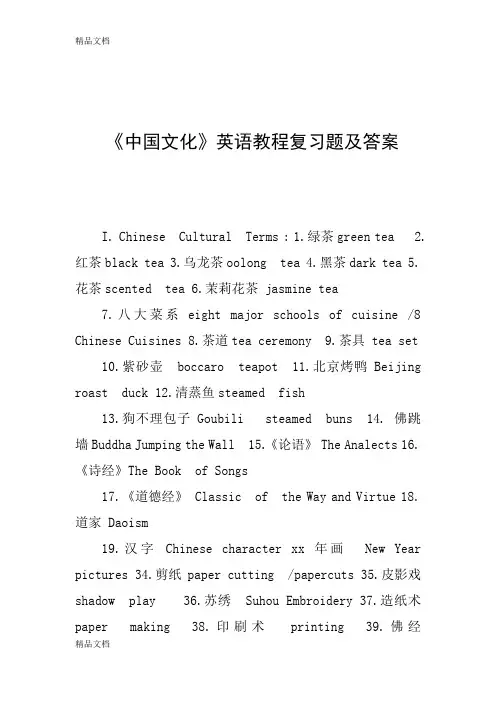
《中国文化》英语教程复习题及答案I. Chinese Cultural Terms : 1.绿茶green tea 2.红茶black tea 3.乌龙茶oolong tea 4.黑茶dark tea 5.花茶scented tea 6.茉莉花茶 jasmine tea7.八大菜系eight major schools of cuisine /8 Chinese Cuisines 8.茶道tea ceremony 9.茶具 tea set 10.紫砂壶 boccaro teapot 11.北京烤鸭Beijing roast duck 12.清蒸鱼steamed fish13.狗不理包子Goubili steamed buns 14. 佛跳墙Buddha Jumping the Wall 15.《论语》 The Analects 16.《诗经》The Book of Songs17.《道德经》 Classic of the Way and Virtue 18.道家 Daoism19.汉字Chinese character xx年画New Year pictures 34.剪纸paper cutting /papercuts 35.皮影戏shadow play 36.苏绣 Suhou Embroidery 37.造纸术paper making 38.印刷术printing 39.佛经Buddhist scripture40.行书 running script /semi-cursive script 41.草书 cursive script42.楷书 regular script/standard script43.隶书 official script/ clerical script 44.砚the ink slab/ the ink stone; 墨ink stick45.六艺:礼乐射御书数“six arts”: ritual,music,archery, carriage driving , calligraphy , and mathematics 46.毛笔the writing brush 47.宣纸xuan paper/ rice paper 48.中国书法Chinese calligraphy 49.简体字: simplified characters50. 繁体字complex characters/ traditional characters 51.中国结 Chinese knots 52.佛教 Buddhism 53.国徽 national emblem 54. 国旗 national flag 55. 国歌 national anthemII. Multiple choices1)Which of the following is irrelevant to the pictographic symbols of Chinese characters? ___A Aspiration. 吸 ? Imagination.想象 ? Creativity.创造力 ? Allusion.典故2) Which of the following statements is true of the name of Fudan University___DThe characters both stand for \这些字符都代表着“太阳在地平线上升起”The name is taken from a Chinese classical poem.这个名字取自中国古典诗歌The name encourages the students to get up earlyin the morning.这个名字鼓励学生早上早起The characters are intended to tell the studentsto make progress dayby day.这些字旨在让学生们一天天地进步3) Which of the following languages mostly consistsof language pictures? B___Mandarin Chinese. 普通话Hieroglyphs of ancient Egypt.古埃及的象形文字 ? Oracle-bone inscription. 甲骨文 ? Seal characters.篆书4) The symbol for “swimming” is closest to ___.Coracle-bone inscription甲骨文? Mandarin Chinese普通话 ? seal characters 篆书? none of the above没有选项5)The symbol for “athletics”contains theingredients of ___.Adancing and running跳舞、跑步 ? running and swinging 跑步和摆动 ? dancing and swinging 跳舞和摆动 ? triathlon and football铁人三项和足球6)All the following are the titles of Confucius except ___.Ban educator一个教育家 ? A biologist 一个生物学家 ? A scholar 有识之士A philosopher一个哲学家7)The expression “filial piety” most probably means being ___.DLoyal to the state忠于国家Obedient to sister(s) 听姐姐的话Responsible for the family 对家庭负责 Dutiful to parents孝顺父母8)Which of following can best describe Confucius’view on the relationship between man and nature ___.DBrothers兄弟Husband and wife 夫妇Doctor and patient 医生和病人 Mother and son母子 9)Through burial and ancestral worship rituals,people can learn that ___.BNature is lifeless so it will never die自然是没有生命的,所以它永远不会死。
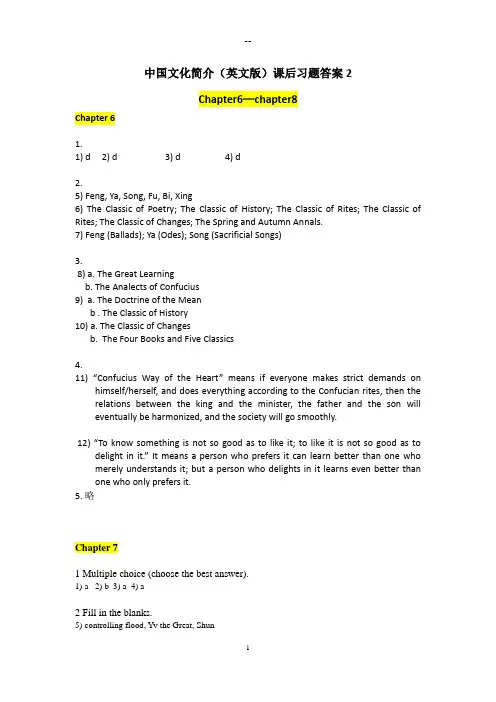
中国文化简介(英文版)课后习题答案2Chapter6—chapter8Chapter 61.1) d 2) d 3) d 4) d2.5) Feng, Ya, Song, Fu, Bi, Xing6) The Classic of Poetry; The Classic of History; The Classic of Rites; The Classic of Rites; The Classic of Changes; The Spring and Autumn Annals.7) Feng (Ballads); Ya (Odes); Song (Sacrificial Songs)3.8) a. The Great Learningb. The Analects of Confucius9) a. The Doctrine of the Meanb . The Classic of History10) a. The Classic of Changesb. The Four Books and Five Classics4.11) “Confucius Way of the Heart”means if everyone makes strict demands onhimself/herself, and does everything according to the Confucian rites, then the relations between the king and the minister, the father and the son will eventually be harmonized, and the society will go smoothly.12) “To know something is not so good as to like it; to like it is not so good as todelight in it.” It means a person who prefers it can learn better than one who merely understands it; but a person who delights in it learns even better than one who only prefers it.5. 略Chapter 71 Multiple choice (choose the best answer).1) a 2) b 3) a 4) a2 Fill in the blanks.5)controlling flood, Yv the Great, Shun6)Pan Gu, Nv Wa, her own model, yellow clay3 Translate the following terms into English7)a. the descendants of Yan and Huang b. Yv the Great controlling the flood8)a. the Eight Immortals crossing the sea. b. Nv Wa creating man9)a. Pan Gu creating the world b.Kua Fu chasing the Sun4 Answer the following questions.10)Huang Di is resourceful in invention as well as in war and is credited with the invention of many things, like carts and boats, clothes, houses, writing and silkworm breeding and Silk weaving. Yan Di is credited with the invention of farming and medicine. He invented the wooden plow and taught people how to treat diseases. Wars urged the mixture and the assimilation of different tribes and eventually formed a tribal alliance of Huang Di and Yan Di. Traditions has it that Chinese civilization originated from the era of Huang Di and Yan Di, for they are the ancestors of the Chinese people. That is why the Chinese call themselves the descendants of Yan and Huang.11)略5 Retell the stories with the help of the following pictures.略Chapter 81.1) a 2)d 3)d 4) a2.5) the guti verse forms, jinti verse forms, classical, verse form, moder6) Shijing7) Li Sao8) Sage Poet, the greatest realist poet9) Su Shi, Li Qingzhao3.10) a. Tang Poems b. Songci11) a. yuanqu b. Chuci4.12) Yuefu originally referred to the “music bureau” in the Han Dynasty, responsible for collecting or writing poems, folk songs and ballads, and having them set to music. Later, poems, folk songs and ballads collected and compiled by yufu were given the name Yuefu.13) Ci is a kind of poetry written to certain tunes with strict tonal patterns and rhyme schemes, in fixed numbers of lines and words, originated in Tang Dynasty and fully developed in Song Dynasty.14) Apart from the above verse forms, there is also Fu, it’s something between poetry and prose, similar to rhapsody: a descriptive poem, and much cultivated from Han times to the Six Dynasties. Examples are Su Shi's “Fu on the Red Cliff”, Ban Gu’s Rhapsody on Two Capitals”, etc.5. 略。
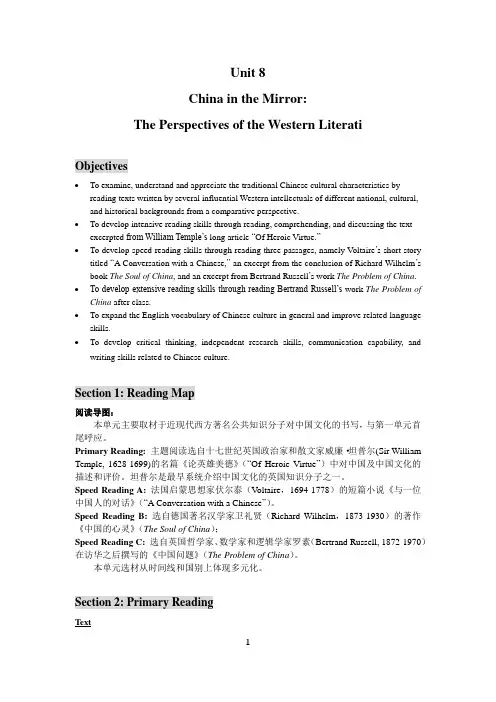
Unit 8China in the Mirror:The Perspectives of the Western LiteratiObjectives•To examine, understand and appreciate the traditional Chinese cultural characteristics by reading texts written by several influential Western intellectuals of different national, cultural, and historical backgrounds from a comparative perspective.•To develop intensive reading skills through reading, comprehending, and discussing the text excerpted from William Temple’s long article “Of Heroic Virtue.”•To develop speed reading skills through reading three passages, namely Voltaire’s short story titled “A Conversation with a Chinese,” an excerpt from the conclusion of Richard Wilhelm’s book The Soul of China, and an excerpt from Bertrand Russell’s work The Problem of China. •To develop extensive reading skills through reading Bertrand Russell’s work The Problem of China after class.•To expand the English vocabulary of Chinese culture in general and improve related language skills.•To develop critical thinking, independent research skills, communication capability, and writing skills related to Chinese culture.Section 1: Reading Map阅读导图:本单元主要取材于近现代西方著名公共知识分子对中国文化的书写,与第一单元首尾呼应。
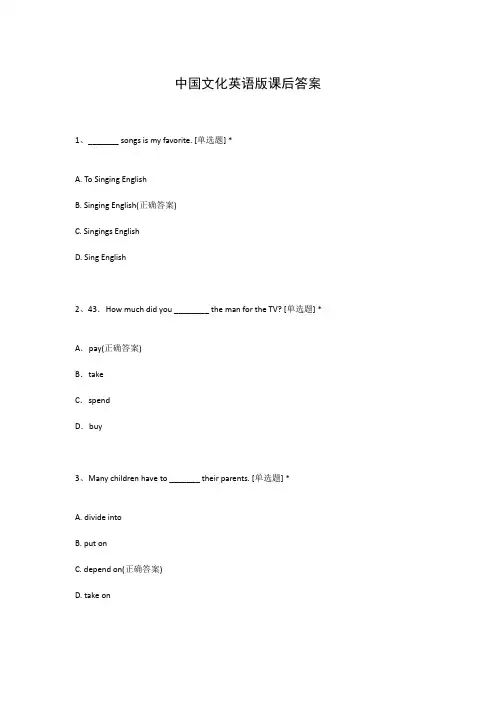
中国文化英语版课后答案1、_______ songs is my favorite. [单选题] *A. To Singing EnglishB. Singing English(正确答案)C. Singings EnglishD. Sing English2、43.How much did you ________ the man for the TV? [单选题] * A.pay(正确答案)B.takeC.spendD.buy3、Many children have to _______ their parents. [单选题] *A. divide intoB. put onC. depend on(正确答案)D. take on4、What he said sounds _______. [单选题] *A. pleasantlyB. nicelyC. friendly(正确答案)D. wonderfully5、It took a long time to _______ Tom to go shopping with me. [单选题] *A. speakB. tellC. persuade(正确答案)D. talk6、—Tony, it’s cold outside. ______ wear a jacket?—OK, mom.()[单选题] *A. Why not(正确答案)B. Why don’tC. Why did youD. Why do you7、____ is standing at the corner of the street. [单选题] *A. A policeB. The policeC. PoliceD. A policeman(正确答案)8、It _____ us a lot of time to do this job. [单选题] *A. spentB. madeC. took(正确答案)D. cost9、I hope to see you again _______. [单选题] *A. long long agoB. long beforeC. before long(正确答案)D. long10、You can buy some pieces of bread from "_______". [单选题] *A. Bakery(正确答案)B. Travel AgencyC. LaundryD. Ticket Office11、At nine yesterday morning, I ______ an English class while they ______ a PE class.()[单选题] *A. was having; were having(正确答案)B. had; hadC. was having; hadD. had; were having12、2.I think Game of Thrones is ________ TV series of the year. [单选题] *A.excitingB.more excitingC.most excitingD.the most exciting (正确答案)13、—_____ will the bus arrive? —In four minutes. [单选题] *A. How longB. How oftenC. How soon(正确答案)D. How far14、20.Sometimes it often rains ________ in my hometown in summer. [单选题] *A.heavyB.hardlyC.heavily(正确答案)D.strongly15、58.—How much is Lucy's skirt?—She________320 yuan for it. I think it's a little dear. [单选题] *A.tookB.paid(正确答案)C.spentD.bought16、79.On a ________ day you can see the city from here. [单选题] *A.warmB.busyC.shortD.clear(正确答案)17、The hall in our school is _____ to hold 500 people. [单选题] *A. big enough(正确答案)B. enough bigC. very smallD. very big18、Chinese people spend _____ money on travelling today as they did ten years ago. [单选题] *A. more than twiceB. as twice muchC. twice as much(正确答案)D. twice more than19、76.—Could you tell me ________the bank?—Turn right and it's on your right. [单选题]* A.how get toB.how to getC.how getting toD.how to get to(正确答案)20、22.______ is convenient to travel between Pudong and Puxi now. [单选题] *A.It(正确答案)B.ThisC.ThatD.What21、56.Sam is in a hurry. Maybe he has got ________ important to do. [单选题] * A.everythingB.nothingC.anythingD.something(正确答案)22、Sitting at the back of the room()a very shy girl with two bright eyes. [单选题] *A. is(正确答案)B. areC. hasD. there was23、We can _______ some information about this city on the Internet. [单选题] *A. look up(正确答案)B. look likeC. look afterD. look forward to24、21 In a few years' time, there ________ thousands of trees on the hill. [单选题] *A.will haveB.will be(正确答案)C.are haveD.have25、We are living in an age()many things are done by computer. [单选题] *A. thatB. whichC. whyD. when(正确答案)26、Tomorrow is Ann’s birthday. Her mother is going to make a _______ meal for her. [单选题] *A. commonB. quickC. special(正确答案)D. simple27、Mr. Brown ______ the football match next week.()[单选题] *A. is seeingB. seesC. sawD. is going to see(正确答案)28、41.My father is a headmaster and he is _____ charge _____ a primary school. [单选题] *A./, ofB./, withC.in, of (正确答案)D.in, with29、Comparatively speaking, of the three civil servants, the girl with long hair is _____. [单选题] *A. more helpfulB. extremely helpfulC. very helpfulD. the most helpful(正确答案)30、46.The pants look cool.You can ________. [单选题] *A.try it onB.try on itC.try them on(正确答案)D.try on them。
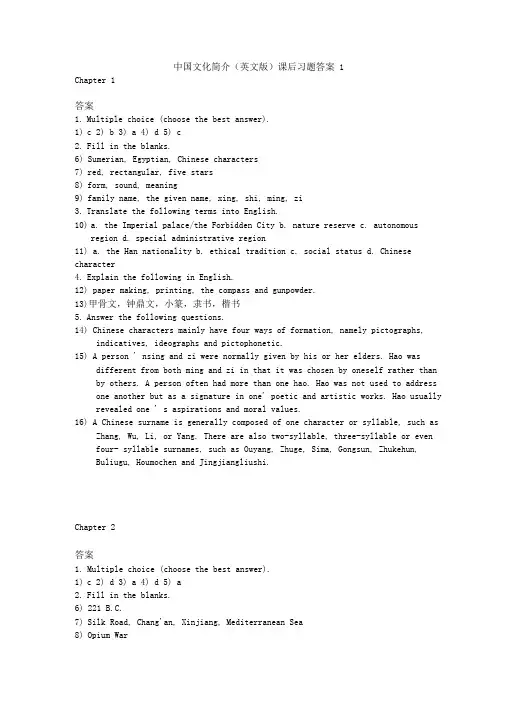
中国文化简介(英文版)课后习题答案 1Chapter 1答案1.Multiple choice (choose the best answer).1)c 2) b 3) a 4) d 5) c2.Fill in the blanks.6)Sumerian, Egyptian, Chinese characters7)red, rectangular, five stars8)form, sound, meaning9)family name, the given name, xing, shi, ming, zi3.Translate the following terms into English.10)a. the Imperial palace/the Forbidden City b. nature reserve c. autonomousregion d. special administrative region11) a. the Han nationality b. ethical tradition c. social status d. Chinese character4.Explain the following in English.12)paper making, printing, the compass and gunpowder.13)甲骨文,钟鼎文,小篆,隶书,楷书5.Answer the following questions.14)Chinese characters mainly have four ways of formation, namely pictographs,indicatives, ideographs and pictophonetic.15) A person ' nsing and zi were normally given by his or her elders. Hao wasdifferent from both ming and zi in that it was chosen by oneself rather than by others. A person often had more than one hao. Hao was not used to address one another but as a signature in one' poetic and artistic works. Hao usually revealed one ' s aspirations and moral values.16) A Chinese surname is generally composed of one character or syllable, such asZhang, Wu, Li, or Yang. There are also two-syllable, three-syllable or even four- syllable surnames, such as Ouyang, Zhuge, Sima, Gongsun, Zhukehun,Buliugu, Houmochen and Jingjiangliushi.Chapter 2答案1.Multiple choice (choose the best answer).1)c 2) d 3) a 4) d 5) a2.Fill in the blanks.6)221 B.C.7)Silk Road, Chang'an, Xinjiang, Mediterranean Sea8)Opium War9)Sun Yat-sen, feudal monarchical system3.Translate the following terms into English.10)a. the Paleolithic Era b. the Neolithic Age c. slave society d. Dream of RedMansions11)a. painted pottery b. the spring and Autumn Period c. socialist market economyd. Opium War4.Explain the following in English.12)During the reign of Emperor Wudi (Liu Che, r. 140-87 B.C.), the Han regimereached the period of its greatest prosperity: The emperor conquered theXiongnu nomads, and sent Zhang Qian as envoy to the Western Regions (Central Asia), and in the process pioneered the route known as the "Silk Road" from the Han capital Chang'an (today's Xi'an, Shaanxi Province), through Xinjiang and onward, finally reaching the east coast of the Mediterranean Sea.13)During the Spring and Autumn and Warring States periods, philosophy and otherbranches of scholarship were unprecedentedly thriving, with therepresentatives of various schools vying with each other in writing books to discuss politics and analyze society. Hence the appearance of a situation in which "a hundred schools of thought contended."5.Answer the following questions.14)The Opium War was the turning point in Chinese history in that it marked theclose of the ancient period and the beginning of the modern history.15)The reason why the construction of the Dujiang Dam was so important inChinese ancient times is that it made possible rationalized irrigationsupply, flood diversion and sand discharge.16)During his reign, Qin Shi Huang standardized the script, currencies, andweights and measures, established the system of prefectures and counties, and constructed the world-renowned Great Wall as well as a large palace,mausoleum and temporary regal lodges respectively in Xianyang, Lishan andother places. In addition, the life-size terracotta horses and armoredwarriors excavated from sites near the mausoleum of Qin Shi Huang are known as the eighth wonder of the world.Chapter 3答案1.Multiple choice (choose the best answer).1.d 2) b 3) a 4) b 5) d2.Fill in the blanks.6)3000, 727)li, yi, yi8)Mo Zi9)Xun Zi, nature, materialism, atheism3.Translate the following terms into English.10)a. Confucianism b. ( Sun Wu’s ) the Art of War c. Confucian analects d. Second Sage11)a. the feudal landlord class b. conservatism c. the policy of benevolence d. the nine-squarefield system4.Explain the following in English.12)The six documents (The Six Classics) under Confucius compilation include Shi (The Book ofSongs), Shu (Collection of Ancient Texts), Li (The Rites), Yue (The Music), Yi (I Ching, or The Classic of Changes), andChun Qiu (The Spring and Autumn Annuals), which are considered as the classics of Confucianism.13)Mencius believed that human beings are good by nature. He held that this goodnessis innateand can be acquired without learning or thinking; one’ s natural goodness is presented by the exercise of benevolence, righteousness, proprieties and prudence. Evil comes into being when one rejects their natural goodness.5.Answer the following questions.14)According to Mencius, the ideal moral personality is that one should never be “ corruptedby neither riches nor honors, shaken by neither peorvty nor adversity, faltered by neither threats nor force ”.15)Han Feizi argued that human nature is basically selfish, and thus the social order can bemaintained only when the ruler imposes rules and his subjects must obey withoutquestioning and enforces them with strict punishments. As a moral and ethical system,“isrtehne ” central theme of Confucius Analects, which focuses on human love that is hierarchical and differentiated. Thus Confucius created his version of humanism. In his idea, human nature is partially good and partially evil. Based on “ ren ” , Confucoibujsected to the fantastic powers that confused the human spirit.16)As one of the greatest thinkers and educators in the history of China, Confucius contributionslie in the following three aspects. Firstly, he compiled and preserved literary works of three generations. The six documents (The Six Classics) under his compilation, including Shi (The Book of Songs), Shu (Collection of Ancient Texts), Li (The Rites), Yue (The Music), Yi(I Ching, or The Classic of Changes), and Chun Qiu (The Spring and Autumn Annuals), areconsidered as the classics of Confucianism. Secondly, Confucius established a system of philosophical thoughts with “ ren ” (benevolenaces)its fundamental virtue. Thirdly, Confucius established private schools and founded a systematic educational framework.Chapter 4答案1.Multiple choice (choose the best answer).1) d 2) d 3) b 4) b 5) c2.Fill in the blanks.6)naturalistic, primitive7)the simplicity, true nature, selfishness, desire8)Old Master9)the social order, individual freedom3.Translate the following terms into English.10)a. prehistoric times b. pessimism c. Taoism d. men-cosmos correspondence11)a. Chinese martial arts b. astrology c. Chinese alchemy d. social order4.Explain the following in English.12)compassion, moderation, and humility13)Mount Longhu (Mount Dragon and Tiger) in Jiangxi Province, Mount Qingcheng in Sichuan Province,Mount Wudang in Hubei Province, and Mount Qiyun in Anhui Province.5.Answer the following questions.14)The core of Lao Zi ' thought is "Tao'(the Way), by which he refered to the condition of theuniverse before the creation of the heaven and the earth. Therefore, it is from Tao that all the elements of the universe are derived. Reversal enables Tao to have a circular movement, that is, when the development of anything brings it to one extreme, a reversal to the other extreme takes place.15)Taoism is one of the most important religions in China, which refers to a variety of relatedphilosophical and religious traditions and concepts. These traditions have influenced East Asia for over two thousand years and some have spread to the West. As the native religion of China, Daoism, together with Confucianism and Buddhism, comprises the main body of traditional Chinese culture. Daoists, in pursuit of the ideal of becoming immortals by practicing Dao, made great efforts to transcend conventional wisdom about life and knowledge and thus helped both to define ancient science in China and to advance it through a great number of inventions. Chinese alchemy, astrology, cuisine, several Chinese martial arts, Chinese traditional medicine, fengshui, and many styles of qigong breath training disciplines have been intertwined with Daoism throughout history.16)Lao Zi ' s “ruling by non-action or inaction reflects the exploration of an intellectual forthe ultimate solution of the social order and individual freedom. His pursuit of vacuity and action through non-action echoes the reality of his time, a period torn by ceaseless wars among states. Lao Zi used the term broadly with simplicity and humility as key virtues, often in contrast to selfish action. On a political level, it means avoiding wars, harsh laws and heavy taxes. For him, it was more important to “see the simplicity, to realize one ' s true nature, to castselfishness, and to temper desireChapter 5答案1.Multiple choice (choose the best answer).1)c 2) c 3) a 4) a 5) d2.Fill in the blanks.6)the Han Dynasty, the Sui and Tang7)Confucianism, Taoism8)Wutai, the “ roof of northern China ”9)Buddhist temples, 76 temples, first3.Translate the following terms into English.10)a. Buddhism b. meditation c. Confucianism d. Buddhist temple11)a. the Great Buddha Hall b. Buddhist scripture c. joss stick d. summer resort4.Explain the following in English.12)The Four Wonders of Mount Emei are the “GolderSummit Sunrise " :' Seof Clouds” ,“Buddha' s Halo " and the “Holy Lamp” .13)The Ten Schools of Chinese Buddhism are as follows:a.Reality School or Kosa School or Abhidharma School.b.Satysiddhi School or Cheng-se School.c.Three Sastra School or San-lun School.d.The Lotus School or T'ien-t'ai School.e.The Garland School or Hua-yen.f.Intuitive School or Ch'an School or Dhyana School.g.Discipline School or Lu School or Vinaya School.h.Esoteric School or Chen-yien School or Mantra School.i.Dharmalaksana School or Ch'u-en School or Fa-siang School.j.Pure-land School or Sukhavati School or Ching-t'u School.5.Answer the following questions.14)The cornerstone of Buddhist philosophy is the view that all life is suffering.15)the doctrine of Four Noble Truths refers to: life is suffering, the cause of suffering isdesire, the answer is to quench desire, and the way to this end is to follow the Eight-Fold Path, which consists of right knowledge, right thought, right speech, right behavior, right livelihood, right effort, right mindfulness and right concentration.16)When Li Bai, famous Chinese poet of the Tang Dynasty, was invited to Mount Jiuhua, he wasoverwhelmed by the scene of nine peaks that look like lotus blooms from heaven. Out of admiration he composed the lines: "Twcforces preserve between the World and the Heaven; Nine lotuses blossom on the Jiuhua Mountain. "Since then the mountain has been attracting men of letters throughout the ages, and thus Jiuhua obtained its fame.第二章中国文史小常识1、谥号是古代对死去的人按其生平事迹评定后,给予褒贬或屿的称号,谥号可与庙号结合,或为全称的组成部分,也可独立使用。
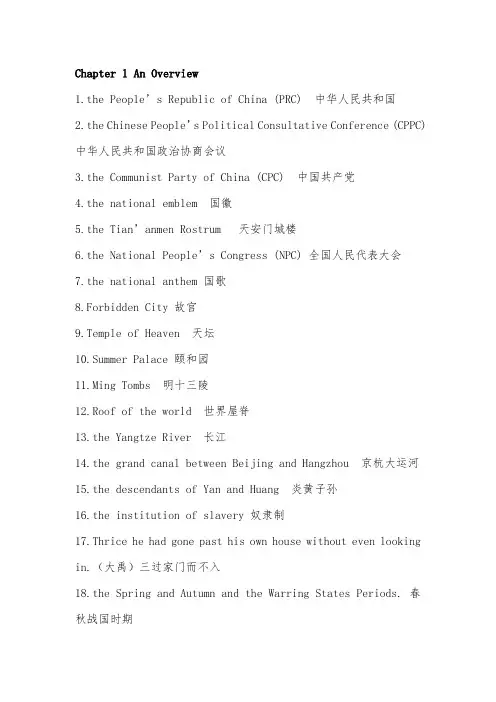
Chapter 1 An Overview1.the People’s Republic of China (PRC) 中华人民共和国2.the Chinese People’s Political Consultative Conference (CPPC)中华人民共和国政治协商会议3.the Communist Party of China (CPC) 中国共产党4.the national emblem 国徽5.the Tian’anmen Rostrum 天安门城楼6.the National People’s Congress (NPC) 全国人民代表大会7.the national anthem 国歌8.Forbidden City 故宫9.Temple of Heaven 天坛10.Summer Palace 颐和园11.Ming Tombs 明十三陵12.Roof of the world 世界屋脊13.the Yangtze River 长江14.the grand canal between Beijing and Hangzhou 京杭大运河15.the descendants of Yan and Huang 炎黄子孙16.the institution of slavery 奴隶制17.Thrice he had gone past his own house without even looking in.(大禹)三过家门而不入18.the Spring and Autumn and the Warring States Periods. 春秋战国时期19.the Three Kingdoms Period. 三国时期20.a tripartite balance 三国鼎立21.Clothed sd in the yellow imperial gown. 黄袍加身unch a rebellion. 起义23. Ascend the throne. 登基24.the Opium War. 鸦片战争25.A country of semi-feudal, semi-colonial status. 半殖民地半封建社会26.the Republic of China. 中华民国27.the anti-Japanese War and the Liberation War. 抗日战争和解放战争28.Lunar calendar. 阴历29.A three-tier system. 三级建制30.Special administrative regions.(SAR) 特别行政区31.Statistical Communique on National Economic and Social Development. 国民经济和社会发展统计公报32.the National Bureau of Statistical. 国家统计局33.the policy of family planning. 计划生育政策34.the Standing Committee of the NPC. 全国人民代表大会常务委员会35.the State Council. 国务院36.the Central People’s Government. 中央人民政府37.Macro control. 宏观调控38.the gross domestic product(GDP). 国内生产总值39.the Chief Architect of China’s Reform. 改革开放总设计师Chapter 2 Philosophy and Religions1.Four Great Inventions. 四大发明2.A hundred schools of thought contend. 百家争鸣3.The philosophy in Pre-Qin times. 先秦子学4.Benevolence and justice, allegiance and forbearance. 仁、义、忠、恕5.The golden mean. 中庸6.Non-action. 无为7.The orthodox philosophy during the Han dynasty. 两汉经学8.Banning all schools of thought except Confucianism. 罢黜百家,独尊儒术9.Human behaviour finds responses in Heaven. 天人感应10.The power of the emperors are authorized by Heaven. 君权神授11.Man is an integral part of nature. 天人合一12.Metaphysics during the Wei and Jin dynasties. 魏晋玄学13.The Book of Changes. 易经14.Three profound studies. 三玄15.The Buddhist Philosophy during the Sui and Tang dynasties. 隋唐佛学16.Neo-Confucianism in Song and Ming dynasties. 宋明理学17.Application philosophy in the Ming and Qing dynasties. 明清实学18.Nirvana 涅槃19.To prefer it is better than only to know it, to delight in it is better than merely to prefer it. 知之者不如好之者,好之者不如乐之者20.Opportunities vouchsafed by Heaven are less important than terrestrial advantages, which in turn are less important than the unity among people. 天时不如地利,地利不如人和21.Chinese Chan Buddhism. 禅宗22.Preaches epiphany. 顿悟23.Buddhist scriptures. 经文24.The three obediences and four virtues. 三从四德25.Morality, proper speech, modest manner,and diligence. 品德、言语、仪态、女工26.To father before marriage, to husband after marriage, and to son after becoming a widow. 未嫁从父,既嫁从夫,夫死从子27.The three basic rules and five constant virtues. 三纲五常28.A king should rule over his subjects; a father, his son; a husband, his wife. 君为臣纲,父为子纲,夫为妻纲29.Benevolence, righteousness,propriety, wisdom,and fidelity. 仁、义、礼、智、信30.A celestial being. 仙人31.Jude Pure, upper Pure, great Pure. 玉清、上清、太清32.When the Eight Immortals cross the sea, each demonstrates his/her divine power. 八仙过海,各显神通33.Dragon-Tiger Mountain. 龙虎山34.The Eight-Fold Path. 八正道35.The four Heavenly kings. 四大天王ughing Buddha. 弥勒佛37.The great buddha hall. 大雄宝殿38.The Eighteen Arhats. 十八罗汉39.The White Horse Temple. 白马寺Chapter 3 Literature1.the Book of Songs. 《诗经》2.Poetry of the South. 《楚辞》3.Feng or folk ballads. 风4.Ya or dynastic hymns. 雅5.Song or sacrificial songs. 颂6.The journey is long, /I’ll search up and down. 路漫漫其修远兮,吾将上下而求索7.Sorrow after Departure. 《离骚》8.Ask Heaven. 《天问》9.Nine Elegies. 《九章》10.Nine Songs. 《九歌》11.the Prose of the Pre-Qin Period. 先秦散文12.Historical prose. 历史散文13.Philosophical prose. 诸子散文14.The Book of History. 《尚书》15.Spring and Autumn Annal. 《春秋》16.Zuo’s Commentary. 《左传》17.Intrigues of the Warring States. 《战国策》18.Discourses of the States. 《国语》19.The Analects of Confucius. 《论语》20.On Faults of Qin. 《过秦论》menting Qu Yuan. 《吊屈原赋》22.Master Void Rhapsody. 《子虚赋》23.Rhapsody on Great Man. 《上林赋》24.Records of the Grand Historian. 《史记》25.Southeast the Peacock Flies. 《孔雀东南飞》26.The Ballad of Mulan. 《木兰诗》27.The Chile Ballad. 《敕勒歌》28.Vast is the sky, boundless the wilds, grazing the cattle are as the grass bend down in the wind. 天苍苍野茫茫,风吹草低见牛羊29.Seven Masters of the Jian’an Period. 建安七子30.The Sea. 《观沧海》31.A Short Song. 《短歌行》32.The Peach Blossom Spring. 《桃花源记》33.The Literary Mind and the Carving of Dragons. 《文心雕龙》34.The Complete Anthology of Tang Poems. 《全唐诗》35.The Four Literary Eminences. 初唐四杰36.Friendships across the world/make near neighbours of far horizons. 海内存知己,天涯若比邻37.Celestial poet. 诗仙38.Saint poet. 诗圣39.Thinking in the Silent Night. 《静夜诗》40.Hard is the Road to Shu. 《蜀道难》41.Dreaming of Sightseeing in the Tianmu Mountains. 《梦游天姥吟留别》42.Three Officers. 三吏43.The Xin’an Officer. 《新安吏》44.The Shihao Officer. 《石壕吏》45.The Officer at Tongguan Pass. 《潼关吏》46.Three Partings. 三别47.Parting of the Newly-wed. 《新婚别》48.Parting of the Old. 《垂老别》49.Parting of the Homeless. 《无家别》50.Frontier poets. 边塞诗人51.Pastoral poets. 田园诗人52.The Older Charcoal Seller. 《卖炭翁》53.Song of Eternal Sorrow. 《长恨歌》54.Song of a Pipa Player. 《琵琶行》55.The Beautiful Lady Yu. 《虞美人》56.Moon on the Western River. 《西江月》57.Butterfly Loves Flowers. 《蝶恋花》58.Immortals Meeting on the Magpie Bridge. 《鹊桥仙》59.The Powerful and Free School. 豪放派60.To the Tune of Charm of a Maiden Singer:The Red Cliff. 《念奴娇·赤壁怀古》61.To the Tune of Water Melody:The Mid-Autumn Festival. 《水调歌头·明月几时有》62.To the Tune of a Riverside Town:Dreaming of His Deceased Wife. 《江城子·十年生死两茫茫》63.Slow Slow Song. 《声声慢》64.Autumn Thought. 《秋思》65.The Injustice to Dou E. 《窦娥冤》66.Four Dreams of Linchuan. 《临川四梦》67.The Peony Pavilion. 《牡丹亭》68.Romance of the Three Kingdoms. 《三国演义》69.Water Margin. 《水浒传》70.Journey to the West. 《西游记》71.Dream of the Red Mansions. 《红楼梦》72.Three Volumes of Words and Two Volumes of Slapping. 《三言二拍》73.The Scholars. 《儒林外史》74.Strange Tales from a Scholar’s Studio. 《聊斋志异》75.Execute justice in the name of Heaven by killing the rich and relieving the poor. 杀富济贫,替天行道76.Sun Wukong Causing Havoc in the Heavenly Palace. 《孙悟空大闹天宫》77.Zhu Bajie Got Married at Gaolao Village. 《高老庄娶亲》78.Sun Wukong Assaulting Thrice the White-Boned Demon. 《孙悟空三打白骨精》79.Crossing the Flaming Mountain. 《火焰山》80.Encyclopedia 百科全书81.Worldly novels 世情小说82.The mystery tales. 志怪小说83.The eight-part essay. 八股文84.Imperial examination system. 科举制度85.The Hundred Day’s Reform. 百日维新86.Exposure of the Official World. 《官场现形记》87.The Travel Records of Lao Can. 《老残游记》88.Flowers in the Mirror. 《镜花缘》89.The eight models of revolutionary modern operas. 八大革命现代京剧样板戏Lu Xun(鲁迅)90.Fierce-browed, I coolly defy a thousand pointing fingers. Head-bowed, like a willing ox I serve the children. 横眉冷对千夫指,俯首甘为孺子牛91.A Madman’s Diary. 《狂人日记》92.Call to Arms. 《呐喊》93.Wandering. 《彷徨》94.The Story of Ah Q. 《阿Q正传》95.Old Tales Retold. 《故事新编》Mao Dun(矛盾)96.Short Story Monthly. 《小说月报》97.Midnight. 《子夜》98.Spring Silkworms. 《春蚕》99.The Shop of Lin Family. 《林家铺子》Ba Jin(巴金)100.Trilogy of the Turbulent Currents. 《激流三部曲》101.Family. 《家》102.Spring 《春》103.Autumn 《秋》Lao She(老舍)104.the Rickshaw Boy. 《骆驼祥子》105.Four Generations Living Together. 《四世同堂》106.Teahouse 《茶馆》107.Dragon Beard Ditch. 《龙须沟》108.Thunderstorm 《雷雨》, Sunrise 《日出》-------曹禺Sheng Congwen(沈从文)109.Frontier City. 《边城》110.Long River. 《长河》111.The Autobiography. 《从文自传》Ai Qing(艾青)112.Dayan River. 《大堰河》113.Facing Towards the Sun. 《向太阳》114.The Spring. 《春天》115.The Colorful Poem. 《彩色的诗》116.The Fields and the City. 《原野与城市》117.On Poetry. 《诗论》118.On New-Style Poems. 《新诗论》119.Collected Works of New Culture. 《新文艺论集》120.Anthology of Ai Qing. 《艾青全集》Chapter 4 Arts1.the handwriting reveals the writer. 字如其人2.Dian or dot stroke. 点3.Heng or horizontal stroke. 横4.Shu or vertical stroke. 竖5.Pie or curved stroke. 撇6.Gou or hooked stroke. 勾7.Zhe or angular stroke. 辄8.Standalone characters. 独立成字9.The seal form. (zhuan 篆书)10.The official form. (li 隶书)11.The cursive form. (cao 草书)12.The regular form. (kai 楷书)13.The running form. (xing 行书)14.Small seal script. 小篆15.Pictography. 象形文字16.The running regular form. 行楷17.The running cursive form. 行草18.Sage of Chinese calligraphy. 书圣19.The Preface to the Lanting Collection of Calligraphy. 《兰亭集序》20.Painting is said to have the same origin as calligraphy. 书画同源21.Ink-wash painting. 水墨画22.Running Horses. 《奔马图》23.The Foolish Man Moving Mountain. 《愚公移山》24.The excellence of a painting lies in its being alike, yet unlike. Too much likeness flatters the vulgar taste; too much unlikeness deceives the world. 画妙在似与不似之间,太似则媚俗,不似则欺世25.Mural paintings. 壁画26.Wood-cut block print. 木刻版画27.Chinese Spring Festival Pictures. 年画28.Four Treasures of the Study. 文房四宝29.Brush, ink, paper, ink stone. 笔、墨、纸、砚30.Copybook. 字帖31.Heroic forest outlaws. 绿林好汉32.The Oral and Intangible Cultural Heritage. 人类口头非物质文化遗产33.The United Nations Educational, Scientific and CulturalOrganization. (UNESCO)联合国教科文组织34.Face changes. 变脸35.Butterfly’s Love. 《梁山伯与祝英台》36.The West Chamber. 《西厢记》37.Chasing the Fish. 《追鱼》38.The Heavenly Maid and the Mortal. 《天仙配》39.Female Son-in-Law of the Emperor. 《女驸马》40.Acrobatics. 杂技41.Cross-talk. 相声42.Clapper talk. 快板43.Storytelling. 评书44.New Year Gala Show. 春节联欢晚会45.Puppet Show. 木偶戏46.Shadow Play. 皮影戏47.Ghost-Exorcising Opera. 傩舞48.Plucked Instruments. 弦乐器49.Ambush on All Sides. 《十面埋伏》50.Spring Moonlight on the Flowers by the River. 《春江花月夜》51.Zither. 古筝52.Singing on the Return of Fishing Boats. 《渔舟唱晚》53.Hight Mount Flowing Water. 《高山流水》54.Two Springs Reflect the Moon. 《二泉映月》55.Percussion Instruments. 打击乐器56.Wind Instruments. 管弦乐57.Ceremonial horn. 唢呐58.One Hundred Birds Serenade the Phoenix. 《百鸟朝凤》59.Bamboo flute. 笛子Chapter 5 Education1.Private schools. 私塾2.Official institutions. 官学3.Persons of virtue. 贤人4.The Four Books and the Five Classics. 四书五经5.The Great Learning, The Doctrine of the Mean, The Analects of Confucius and Mencius. 《大学》、《中庸》、《论语》、《孟子》6.The Book of Poems, The Book of History, The Book of Rites, The Book of Changes, The Spring and Autumn Annals. 《诗经》、《尚书》、《礼记》、《易经》、《春秋》7.The academy of classic learning. 书院8.The books collection mansions. 藏书阁9.Six Skills(Arts):Ritual, Music, Archery, Chariot-Riding, Writing, Arithmetic. 六艺:礼、乐、射、御、书、数10.New learning. 新学11.The Revolution of 1911. 辛亥革命12.Nine-year compulsory education. 九年义务教育13.Ensure an all-round development of the students morally, intellectually, physically and aesthetically. 德智体美全面发展14.Project Hope. 希望工程15.Spring Bud Project. 春蕾计划16.Key institutions. 重点大学17.Spring Sunshine Programme. 春晖计划18.The National College Entrance Examination. 高考。
英语中国文化导论及答案全套1、I have worked all day. I'm so tired that I need _____ . [单选题] *A. a night restB. rest of nightC. a night's rest(正确答案)D. a rest of night2、—______ pencils are these?—They are Tony’s.()[单选题] *A. WhatB. WhereC WhoD. Whose(正确答案)3、—What’s the matter with that boy?—______.()[单选题] *A. He is watching TV in his roomB. He takes his temperatureC. He was playing a toy carD. He hurt his right leg(正确答案)4、I passed the test, I _____ it without your help. [单选题] *A.would not passB. wouldn't have passed(正确答案)C. didn't passD.had not passed5、He spoke too fast, and we cannot follow him. [单选题] *A. 追赶B. 听懂(正确答案)C. 抓住D. 模仿6、It’s so nice to hear from her again. ______, we last met more than thirty year ago [单选题] *A. What ‘s wordB. That’s to sayC. Go aheadD. Believe it or not(正确答案)7、90.—I want to go to different places, but I don’t know the ________. —A map is helpful, I think. [单选题] *A.price(正确答案)B.timeC.wayD.ticket8、It _____ us a lot of time to do this job. [单选题] *A. spentB. madeC. took(正确答案)D. cost9、28.—Where is Fujian Province?—It’s ________ the southeast of China. [单选题] * A.in (正确答案)B.onC.toD.at10、—Are these your sheep? [单选题] *A)on grass at the foot of the hill.(正确答案)B. feedC.is fedD. is feeding11、The organization came into being in 1 [单选题] *A. 开始策划B. 进行改组C. 解散D. 成立于(正确答案)12、John and Jack had looked for the key, but _____ of them found it. [单选题] *A. noneB. neither(正确答案)C. bothD. either13、There _______ no water or milk in the fridge. [单选题] *A. is(正确答案)B. areC. hasD. have14、It’s raining outside. Take an _______ with you. [单选题] *A. cashB. life ringC. cameraD. umbrella(正确答案)15、If the manager had to choose between the two, he would say John was _____ choice. [单选题] *A. goodB. the bestC. betterD. the better(正确答案)16、Grandfather lives with us. We all _______ him when he gets ill. [单选题] *A. look after(正确答案)B. look atC. look forD. look like17、4.—Alice’s never late for school.—________. [单选题] *A.So am I.B.So was I.C.Neither am I. (正确答案)D.Neither have I.18、Mary's watch is more expensive than _____. [单选题] *A. Susan's(正确答案)B. that of Susan'sC. that of SusanD. Susan19、The museum is _______ in the northeast of Changsha. [单选题] *A. sitB. located(正确答案)C. liesD. stand20、Almost every one of us could see her anxiety from the()on her face. [单选题] *A. appearanceB. feelingC. movementD. expression(正确答案)21、The manager was quite satisfied with his job. [单选题] *A. 担心的B. 满意的(正确答案)C. 高兴的D. 放心的22、( ) She keeps on learning English all the time. So far, she______three books of New Concept English. [单选题] *A. has learned(正确答案)B. have learnedC. had learnedD. learn23、I hadn't realized she was my former teacher _____ she spoke [单选题] *A. asB. sinceC. until(正确答案)D. while24、Do you know what()the change in his attitude? [单选题] *A. got throughB. brought about(正确答案)C. turned intoD. resulted from25、She works in a hospital. She is a(n) _______. [单选题] *A. managerB. engineerC. doctor(正确答案)D. patient26、_______, Mr. Smith. [单选题] *A. Here your tea isB. Here is your tea(正确答案)C. Here your tea areD. Here are your tea27、Turn down the music. It hurts my _______. [单选题] *A. noseB. eyesC. mouthD. ears(正确答案)28、The street was named _____ George Washington who led the American war for independence. [单选题] *A. fromB. withC. asD. after(正确答案)29、Grandpa pointed to the hospital and said, “That’s _______ I was born?”[单选题] *A. whenB. howC. whyD. where(正确答案)30、She found her wallet()she lost it. [单选题] *A. where(正确答案)B. whenC. in whichD.that。
人文英语1unit8参考答案人文英语1 Unit 8 参考答案Unit 8: Cultural HeritageSection A: Vocabulary and Grammar1. Multiple Choice Questions- (1) The correct answer is C. "Preservation" as it refers to the act of keeping something in its original state.- (2) The answer is B. "Cultural heritage" is the term used to describe the legacy of physical artifacts and intangible attributes of a group or society that areinherited from past generations, maintained in the present, and bestowed for the benefit of future generations.- (3) The correct answer is A. "Destruction" is the act of causing something to be demolished or ruined.2. Fill in the Blanks- (1) The ancient city has been well preserved for centuries.- (2) The cultural heritage of the region is rich and diverse.- (3) The war led to the destruction of many historical sites.3. Error Correction- (1) The sentence should read: "The preservation ofcultural heritage is crucial for maintaining our identity." - (2) The corrected sentence is: "The destruction of historical monuments is a great loss to humanity."- (3) The error should be corrected to: "The cultural heritage site was restored to its original state."Section B: Reading Comprehension1. True or False Questions- (1) True. The article states that cultural heritage is an important part of our identity.- (2) False. The article mentions that cultural heritageis not only about physical artifacts but also includes intangible aspects.- (3) True. The article discusses the importance of preserving cultural heritage for future generations.2. Comprehension Questions- (1) The main idea of the passage is the significance of preserving cultural heritage and the various forms it can take.- (2) The passage mentions that cultural heritage includes both tangible and intangible elements.- (3) The article suggests that the preservation of cultural heritage is essential for maintaining a connection with the past and for the identity of a society.Section C: Writing Task1. Sample EssayThe preservation of cultural heritage is a critical aspectof our society. It serves as a bridge connecting the past, present, and future. Cultural heritage encompasses a wide range of elements, from historical buildings and artifacts to traditional practices and languages. It is our responsibility to protect and maintain these treasures for the benefit of future generations.To begin with, cultural heritage provides a sense of continuity and identity. It helps individuals understandtheir roots and the evolution of their society. Furthermore, it fosters a sense of pride and belonging among the members of a community.Additionally, cultural heritage is a valuable resource for education and research. It offers insights into the history, art, and social structures of different periods. This knowledge can be used to inform current practices and inspire new ideas.However, cultural heritage is under constant threat from various factors such as urban development, natural disasters, and even political conflicts. It is crucial that we take proactive measures to safeguard these invaluable resources. This can be achieved through legal protections, public awareness campaigns, and international cooperation.In conclusion, the preservation of cultural heritage is not just a matter of sentimentality; it is a vital component of our collective memory and identity. By taking steps to protect and cherish our cultural heritage, we ensure that future generations can continue to learn from and appreciatethe rich tapestry of human history.Section D: Discussion Questions1. Discuss the importance of preserving cultural heritage and how it can contribute to a society's identity.2. What are some of the challenges faced in preservingcultural heritage, and how can they be addressed?3. How can technology be used to assist in the preservation and promotion of cultural heritage?This set of answers provides a comprehensive review of Unit 8, covering vocabulary, grammar, reading comprehension, writing, and discussion topics related to cultural heritage.。
KeysUnit 8Part I Pre-readingSection B Listening Practice1. co-founded2. entrepreneur3. charity4. fascinated5. program6. major7. developer8. managementPart II Active Reading: BiographyTask One1. B2. C3. C4. D5. APart III Language FocusTask One1. tie2. sporadic3. prodigy4. custody5. amateur6. auspicious7. derailed8. surpassed9. duel 10. garnered Task Two1. She likes to show off her husband's fortune at the party.2. Paul the Octopus shot to fame during football World Cup in 2010 for he successfully predicted all the game results.3. They had hoped to sell their second-hand car for $2000, but settled for $1500.4. As the largest contributors to greenhouse gas emissions, the developed countries ought to take the lead in fighting the global climate change, and shoulder special responsibilities.5. U.S. White House spokesman announced that American government had decided to formally withdraw from Kyoto Treaty because the treaty was not in the interest of America.6. Before the Emperor of Han Wu, the emperors generally adopted the policy of marrying a daughter of the Imperial family to the chief of Huns, in exchange for the temporary peace between the two countries.Part IV Chinese & Foreign Culture IntroductionTask OneConfucius (551—479BC), also named Kong Qiu or Kong Zhongni, was an ideologist, politician, educator and founder of Confucianism in the late Spring and Autumn Period. He was born in County Chou of State Lu, today’s Qufu City ofShandong Province. Being in a poor family, he worked very hard ever since his childhood. In his twenties, he became a petty official. As a learned and conscientious man who did outstanding work, only around the age of thirty, he well established his fame. Confucius visited many states of the Zhou Dynasty in an attempt to serve under their rulers. However, none of them accepted his political concepts. Therefore, Confucius decided to devote himself to education. Confucius accepted many students, and thus he initiated the private schooling in the history of Chinese education. The knowledge he taught included: Manners, Music, Literature, Riding, Archery and Mathematics. It is said that he had 3,000 students, among whom 72 became famous scholars.Task Two亚里士多德亚里士多德是古希腊“三大”哲学家之一,其他二位是柏拉图和苏格拉底。
Unit 8 Chinese LiteratureWarm-up ActivityQuestions for discussion:1)Look at the following pictures. They are all illustrations of the famous storiesof the four great novels of Chinese literature. Do you know or can you tell any of these stories?a.Story 1:颐和园长廊上的彩绘:桃园三结义2008-04拍摄,绘画年代大约于19世纪末Oath of the Peach GardenThe Oath of the Peach Garden (桃园三结义) was an oath in the historical novelRomance of the Three Kingdoms, by which the three warriors Liu Bei, Guan Y u, and Zhang Fei became sworn brothers in a ceremony amid peach blossom trees. The original goal of the Peach Garden Oath was to protect the Han Dynasty from the Yellow Turbans. This act bound the three key men of the future Shu-Han Kingdom of China and is often alluded to as a symbol of fraternal loyalty. Nothing in historical records suggest such an event happened, though the three were noted to be close, to the point of sharing the same bed.The oath, as it appears in the Wikisource translation of Romance of the Three Kingdoms/Chapter 1, was this:When saying the names Liu Bei, Guan Yu and Zhang Fei, although the surnames are different, yet we have come together as brothers. From this day forward, we shall join forces for a common purpose, and come to each other's aid in times of crisis. We shall avenge the nation from above, and pacify the citizenry from below. We seek not to be born on the same day, in the same month and in the same year. We merely hope to die on the same day, in the same month and in the same year. May the gods of heaven and earth attest to what is in our hearts. If we should ever do anything to betray our friendship, may the gods in heaven strike us dead.In many other translations, only the section dealing with "dying on the selfsame day" is present. However, the three brothers do not die on the same day: Guan Yu is executed by Sun Quan, Zhang Fei is assassinated by his own men whom he treated with cruelty, and Liu Bei dies of illness after the disastrous attempts to avenge Guan Yu and reclaim the province of Jing.The oath inspired the present day secret societies in Chinese communities, such as the Triad, to use a similar ritual when swearing in new members. "Though not born on the same day of the same month in the same year, we hope to die so" — the phrase the three brothers made during the oath —had also become popular among the present day secret society members. (392 words)(/wiki/Oath_of_the_Peach_Garden)Story 2:颐和园长廊彩绘中的徐庶荐诸葛(三顾茅庐)故事2008-04拍摄,绘画年代大约于19世纪末Three Visits to the Thatched CottageAfter they had become sworn brothers at Taoyuan, Liu Bei, Guan Yu and Zhang Fei made concerted efforts to restore the Han Dynasty. But they felt that it would be impossible to do it without the help of a smart adviser. The Liu-Guan-Zhang alliance later won one battle after another thanks to the advice of Xu Shu. But before long, Xu had to surrender to the opposing camp of Cao Cao in order to save the life of his mother who was abducted by the Cao troops. Before he left, Xu Shu recommended Zhuge Liang to the brothers.Accompanied by Guan Yu and Zhang Fei, Liu Bei went to Wolonggang in Longzhong in the hope of inviting Zhuge Liang to be their military adviser. But Zhuge's servant said: "The Mentor left in the morning." Liu Bei asked the servant to forward to Zhuge Liang his message that the brothers had come to visit him. After that, Liu rode his horse away, returning home sullenly. A few days later when he learned that Zhuge Liang was at home, Liu Bei went for another visit along with Guan Yu and Zhang Fei. The servant said: "The Mentor is reading books at his thatched cottage." Liu requested to see him. When they learned that the one reading books at the thatched cottage was not Zhuge Liang himself but his brother Zhuge Jun, the Liu-Guan-Zhang brothers left a letter to express their admiration and then braved heavy snows to return home.Not long after they returned to their barracks at Xinye, Liu Bei wanted to visit Zhuge Liang's thatched cottage once more. But Guan Y u dissuaded Liu from going by saying that perhaps Zhuge Liang was not as smart as expected and that he was simply dodging the visiting brothers for that. Zhang Fei said: "You don't need to go. I'll tie him up and force him to come and see you instead." Liu Bei lost no time in telling his brothers the story of King Wen bent on visiting one of his subjects called Jiang Ziya. Liu, Guan and Zhang, therefore, paid a third visit to Wolonggang. They had no sooner arrived than the servant said: "The Mentor is sleeping." Liu Bei waited until Zhuge Liang was awake and dressed . Finally, he consented to see the brothers. Liu Bei paid three visits to the thatched cottage without complaint. He finally succeeded in inviting Zhuge Liang to be his military adviser and to help the brothers in their cause. (416 words)三顾茅庐《三国演义》中的故事。
中国文化概论答案英语unit121、Taking the subway is quite fast and cheap. It can _______ both time and money. [单选题] *A. savesB. save(正确答案)C. earnD. use2、—______ is it from your home to the bookstore?—About 15 kilometers.()[单选题] *A. How far(正确答案)B. How muchC. How longD. How many3、I could ______ control my feelings and cried loudly when I heard the bad news. [单选题] *A. hardly(正确答案)B. ?reallyC. clearlyD. nearly4、Many people believe that _________one has, _______ one is, but actually it is not true. [单选题] *A. the more money ; the happier(正确答案)B. the more money ; the more happyC. the less money ; the happierD. the less money ; the more happy5、_______, making some DIY things is fashionable. [单选题] *A. Stand outB. In ones opinionC. In my opinion(正确答案)D. Out of fashion6、His picture is on show in London this month. [单选题] *A. 给...看B. 展出(正确答案)C. 出示D. 上演7、_____ Lucy _____ Lily has joined the swimming club because they have no time. [单选题] *A. Not only; but alsoB. Neither; nor(正确答案)C. Either; orD. Both; and8、Last year Polly _______ an English club and has improved her English a lot. [单选题] *A. leftB. sawC. joined(正确答案)D. heard9、7.—I've got some ________.—Great! I'd like to write with it. [单选题] *A.funB.chalk(正确答案)C.waterD.time10、When we take a trip,we usually have to _______ a hotel. [单选题] *A. takeB. stayC. book(正确答案)D. bring11、66.—How much meat do you want?—________.[单选题] *A.Sorry, there isn't anyB.I can't give you anyC.Half a kilo, please(正确答案)D.Twelve yuan a kilo12、We can’t go out ______ school nights. ()[单选题] *A. inB. on(正确答案)C. atD. by13、7.—________ is the Shanghai Wild Animal Park?—It’s 15km east of the Bund. [单选题] *A.WhoB.WhatC.WhenD.Where (正确答案)14、Catherine has two cousins. One is quiet, and _______ is noisy. [单选题] *A. anotherB. the other(正确答案)C. othersD. other15、English is very important in our daily life. Never _______. [单选题] *A. give up itB. give it up(正确答案)C. give away itD. give it away16、I’m looking forward to hearing from you _______. [单选题] *A. recentlyB. soon(正确答案)C. quicklyD. fast17、The soldiers were_____of running away when the enemy attacked. [单选题] *A.chargedB.accused(正确答案)C.scoldedD.estimated18、Mum is ill. I have to _______ her at home. [单选题] *A. look after(正确答案)B. look forC. look outD. look forward to19、Will you please say it again? I _______ you. [单选题] *A. didn’t hear(正确答案)B. don’t heardC. didn’t heardD. don’t hear20、July hardly joins in any class activities,_____? [单选题] *A. does she(正确答案)B. doesn't sheC. didn't sheD. is she21、It’s raining outside. Take an _______ with you. [单选题] *A. cashB. life ringC. cameraD. umbrella(正确答案)22、Sometimes Americans are said to be _____. [单选题] *A superficially friendB superficial friendC. superficial friendlyD. superficially friendly(正确答案)23、()it is to have a cold drink on a hot day! [单选题] *A. What a great funB. How great funC. What great fun(正确答案)D. How a great fun24、Jack can speak Japanese, and his brother can _______ speak Japanese. [单选题] *A. tooB. also(正确答案)C. eitherD. as well25、_____ the plan carefully,he rejected it. [单选题] *A. To have consideredB.To considerC. Having considered(正确答案)D. Considering26、8.—Will she have a picnic next week?—________. And she is ready. [单选题] *A.Yes, she doesB.No, she doesn'tC.Yes, she will(正确答案)D.No, she won't27、—Why do you call him Mr. Know?—______ he knows almost everything that we want to know.()[单选题] *A. SoB. OrC. ButD. Because(正确答案)28、This girl is my best friend, Wang Hui. ______ English name is Jane.()[单选题] *A. HeB. HisC. SheD. Her(正确答案)29、—______ do you pay for it? —Over the Internet. ()[单选题] *A. WhatB. How muchC. How(正确答案)D. When30、Many of my classmates are working _______volunteers. [单选题] *A. as(正确答案)B. toC. atD. like。
精品文档Unit 8 Chinese Literature Warm-up ActivityQuestions for discussion:1)Look at the following pictures. They are all illustrations of the famous stories of the four great novels of Chinese literature. Do you know or can you tell any of these stories?a.Story 1:颐和园长廊上的彩绘:桃园三结义2008-04拍摄,绘画年代大约于19世纪末精品文档.精品文档Oath of the Peach Gardennovel historical in the 桃园三结义) was an oath the The Oath of Peach Garden (u, and Zhang Romance of the Three Kingdoms, by which the three warriors Liu Bei, Guan YFei became sworn brothers in a ceremony amid peach blossom trees. The original goal of thePeach Garden Oath was to protect the Han Dynasty from the Yellow Turbans. This act bounda to as and is often alluded the key men of future Shu-Han Kingdom of China the threehappened, an event records suggest such of symbol fraternal loyalty. Nothing in historicalthough the three were noted to be close, to the point of sharing the same bed.Three the of Romance of it as appears in the Wikisource translation The oath,Kingdoms/Chapter 1, was this:are surnames although the Guan Yu and Zhang Fei, saying When the names Liu Bei,different, yet we have come together as brothers. From this day forward, we shall join forcesfor a common purpose, and come to each other's aid in times of crisis. We shall avenge thenation from above, and pacify the citizenry from below. We seek not to be born on the sameday, in the same month and in the same year. We merely hope to die on the same day, in thesame month and in the same year. May the gods of heaven and earth attest to what is in our hearts. If we should ever do anything to betray our friendship, may the gods in heaven strikeus dead.In many other translations, only the section dealing with dying on the selfsame day ispresent. However, the three brothers do not die on the same day: Guan Yu is executed by Sun Quan, Zhang Fei is assassinated by his own men whom he treated with cruelty, and Liu Beithe province of dies of illness after the disastrous attempts to avenge Guan Yu and reclaimJing.The oath inspired the present day secret societies in Chinese communities, such as theTriad, to use a similar ritual when swearing in new members. Though not born on the same the phrase the three brothers —day of the same month in the same year, we hope to die so society secret present among the day become —made during the oath had also popular)(392 wordsmembers.)(/wiki/Oath_of_the_Peach_GardenStory 2:颐和园长廊彩绘中的徐庶荐诸葛(三顾茅庐)故事2008-04拍摄,绘画年代大约于19世纪末精品文档.精品文档Three Visits to the Thatched CottageAfter they had become sworn brothers at Taoyuan, Liu Bei, Guan Yu and Zhang Fei madeit to do it would be impossible the to restore Han Dynasty. But they felt that concerted efforts after one battle alliance later won help the of a smart adviser. The Liu-Guan-Zhang without opposing the to surrender to Shu. But before long, Xu had the another thanks to advice of Xu troops. Cao by the mother who was abducted of his of camp Cao Cao in order to save the life Before he left, Xu Shu recommended Zhuge Liang to the brothers.Accompanied by Guan Yu and Zhang Fei, Liu Bei went to Wolonggang in Longzhong in the hope of inviting Zhuge Liang to be their military adviser. But Zhuge's servant said: The Mentor left in the morning. Liu Bei asked the servant to forward to Zhuge Liang his message that thebrothers had come to visit him. After that, Liu rode his horse away, returning home sullenly. A few days later when he learned that Zhuge Liang was at home, Liu Bei went for another visit along thatched his reading books at said: Fei. The servant The Mentor is Zhang with Guan Yu and cottage. Liu requested to see him. When they learned that the one reading books at the thatched cottage was not Zhuge Liang himself but his brother Zhuge Jun, the Liu-Guan-Zhang brothers lefta letter to express their admiration and then braved heavy snows to return home.Not long after they returned to their barracks at Xinye, Liu Bei wanted to visit Zhuge Liang'su dissuaded Liu from going by saying that perhaps Zhuge thatched cottage once more. But Guan YLiang was not as smart as expected and that he was simply dodging the visiting brothers for that. Zhang Fei said: You don't need to go. I'll tie him up and force him to come and see you instead.his one of bent of King Wen on visiting story brothers telling time lost Liu Bei no in his thesubjects called Jiang Ziya. Liu, Guan and Zhang, therefore, paid a third visit to Wolonggang. Theyhad no sooner arrived than the servant said: The Mentor is sleeping. Liu Bei waited until ZhugeLiang was awake and dressed . Finally, he consented to see the brothers. Liu Bei paid three visitsto the thatched cottage without complaint. He finally succeeded in inviting Zhuge Liang to be his military adviser and to help the brothers in their cause. (416 words)三顾茅庐《三国演义》中的故事。